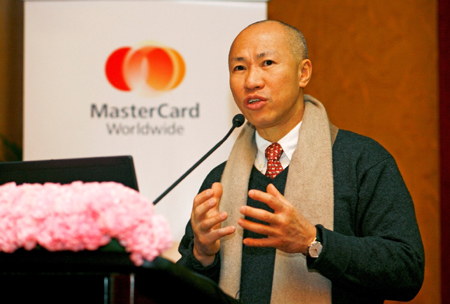
|
BIZCHINA> Top Biz News
 |
|
What will Chinese do when Americans start saving?
By Hao Zhou (chinadaily.com.cn)
Updated: 2009-01-08 11:35 There is no doubt that China and the United States, the largest manufacturers and consumers in the world, respectively, have formed a balance for years. Americans have gotten used to overspending while they enjoy cheap "Made-in-China" products, and the Chinese boast their robust exports growth to the US every single quarter.
 But the balance has changed due to the rapidly-spreading financial crisis. US households are moving from "net debtors" to "net savers," thereby contributing to "massive" global impacts, said Yuwa Hedrick-Wong, chief economic advisor for MasterCard Worldwide Asia-Pacific Region, during his speech in Beijing Jan 6 on his latest study on the global financial crisis. Two years ago, Hedrick-Wong was one of the very few researchers forecasting the ongoing financial crisis and economic recession. "In January 2007, I was seen as extremely pessimistic," said Hedrick-Wong. "I said that by the end of 2007 the US would be in a recession." At that time, nobody believed him. This time, he believes that the US economy will recover in the latter half of 2009. "Now everyone worries about the recession... nobody is talking about the recovery," Hedrick-Wong told China Daily. Hedrick-Wong, however, believes the recovery will come, but will come slowly. "If American households are no longer spending and starting to save, the US will have a very difficult recovery in the second half of 2009, during which the economic growth may stay at 0.5 or 0.7 percent. That is why I am worried about China's dependence on US demand," Hedrick-Wong said. American households' consumption accounts for 70 percent of the US GDP. The US recorded a robust growth of 2.7 percent on average during the 1998-2007 period. But by taking out consumer spending, the growth was only 1.3 percent, according to Hedrick-Wong. Clearly, whether they decide to spend or save has "immediate global ramifications". Americans' income growth was almost "stagnant" in 2004, but American households have been able to borrow a lot more to spend, boosting its domestic demand. This has translated into "global demand" and in many instances, into "demand for China's exports", according to Hedrick-Wong. "So, China's tremendous growth in the last seven or eight years, backed up by its exports, to a very large extent can be attributed to American households being able to borrow more to spend." Therefore, it is not sustainable, and such a formula would no longer apply. From China's perspective, one of the biggest drivers for the demand of Chinese exports has disappeared and may not return in quite a number of years, because American households' additional incomes will quickly go into the payment of debts and building-up of savings in coming years. "They will start saving like crazy," said Hedrick-Wong. China will face "unprecedented" challenges and "a whole new global environment" in terms of its efforts to look for new sources for economic growth in the future, said Hedrick-Wong. The latest survey by MasterCard Worldwide showed that Chinese consumers are still "very confident" on their fixed incomes and living standards. The question is how quickly domestic consumption in China can be jazzed up to compensate for the lost external demand. In 2007, Chinese people saved up to 51 percent and spent only 49 percent of the GDP. Of the 49 percent consumption of the GDP, some 14 percentage points were spent by the government and the remaining 35 percent was citizens' consumption, said Fan Gang, a renowned Chinese economist present at Hedrick-Wong's news briefing. "If consumers save to buy houses and cars, then saving is a leading indicator for more spending. That's fine," said Hedrick-Wong, "But precautionary saving is different." Precautionary saving is due to consumers worrying about the future; they put more money in the bank but won't spend it. Therefore, precautionary saving takes income out of consumption, he said. About 60 percent of Chinese savings are precautionary savings, according to MasterCard's survey. In the short term, as long as Chinese incomes are stable, Chinese households will continue to spend the same proportion. And in the medium term, with upcoming policies to provide better health care, better education, and better social welfare, Chinese households will spend a higher proportion of their incomes, thus benefiting the country's economic growth, said Hedrick-Wong. (For more biz stories, please visit Industries)
|